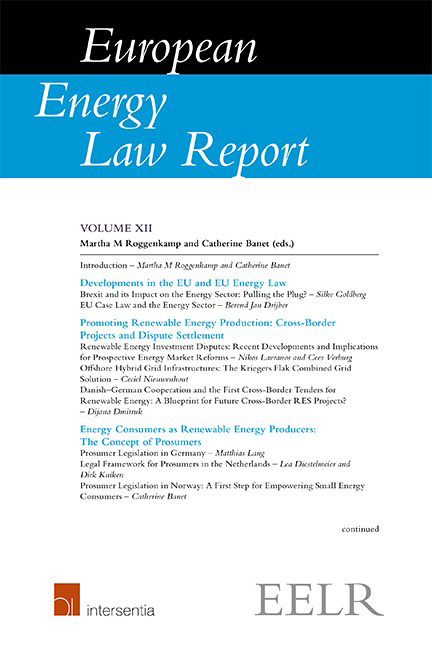Book contents
- Frontmatter
- Preface
- Contents
- List of Abbreviations
- List of Contributors
- Introduction
- PART I Developments In The EU and EU Energy Law
- PART II Promoting Renewable Energy Production: Cross-Border Projects And Dispute Settlement
- PART III Energy Consumers As Renewable Energy Producers: The Concept Of Prosumers
- Chapter VI Prosumer Legislation in Germany
- Chapter VII Legal Framework for Prosumers in the Netherlands
- Chapter VIII Prosumer Legislation in Norway: A First Step for Empowering Small Energy Consumers
- PART IV Balancing Renewable Electricity Production Withsupply Security: National Experiences With Capacity Mechanisms
- PART V Promoting The Use Of Sustainable Gas And Security Of Gas Supply
Chapter VI - Prosumer Legislation in Germany
from PART III - Energy Consumers As Renewable Energy Producers: The Concept Of Prosumers
Published online by Cambridge University Press: 31 January 2019
- Frontmatter
- Preface
- Contents
- List of Abbreviations
- List of Contributors
- Introduction
- PART I Developments In The EU and EU Energy Law
- PART II Promoting Renewable Energy Production: Cross-Border Projects And Dispute Settlement
- PART III Energy Consumers As Renewable Energy Producers: The Concept Of Prosumers
- Chapter VI Prosumer Legislation in Germany
- Chapter VII Legal Framework for Prosumers in the Netherlands
- Chapter VIII Prosumer Legislation in Norway: A First Step for Empowering Small Energy Consumers
- PART IV Balancing Renewable Electricity Production Withsupply Security: National Experiences With Capacity Mechanisms
- PART V Promoting The Use Of Sustainable Gas And Security Of Gas Supply
Summary
INTRODUCTION
Germany has plenty of energy legislation. The reason is that German politicians like energy law, or rather the use of it to implement their political goals. For many decades the energy industry has been a key focus area of German policy. A great number of laws and their amendments cover the desired – or undesired – form of energy generation and supply. Since the 1990s a key theme has been the promotion of renewable energies to achieve the Energiewende (energy turnaround), ie the change from nuclear and conventional fuels to renewable energy sources. Starting with the initial Energy Feed-in Act (Stromeinspeisegesetz) of 7 December 1990, the German energy industry has undergone numerous changes. Further changes have been strongly influenced by different versions of the Renewable Energy Sources Act (EEG), the successor of the Energy Feed-in Act.
The concept of ‘prosumers’ has not been at the forefront of German renewable energy interest. However, recent interest in controlling the costs of the Energiewende has led to specific rules for prosumers. In recent years, the need to allocate costs and to integrate the ever growing quantities of renewable energy 6 into the energy market has become increasingly important. As renewable energy installations are often not owned by traditional energy supply companies, the number and range of actors in the energy sector has increased. 7 In addition to the conventional larger energy generators more and more private households, farmers, energy cooperatives and other independent power producers have started to generate electricity from renewable energy sources. 8 Furthermore, several (often larger) power consumers have built their own (conventional and renewable) generating plants due to a commercially favourable regulatory framework, as prosuming leads to particular benefits. Consequently, prosuming, ie combining production and consumption, has attracted more interest. With decreasing costs of photovoltaic installations and possible battery storage, the potential for becoming prosumers, particularly in the private residential sector, is now further increasing in another area.
The term ‘prosumer’ does not as yet appear in German energy law. Despite the growing popularity of prosumption, the overarching concept is not recognised in German law, neither in the Renewable Energy Sources Act nor in any other of the various energy statutes. 9 In Germany issues relating to ‘prosumption’ are dealt with under the heading of ‘ self-supply ’ (Eigenversorgung), often also referred to as ‘auto-supply’, ‘auto-generation’ or ‘self-consumption’.
- Type
- Chapter
- Information
- European Energy Law Report XII , pp. 135 - 150Publisher: IntersentiaPrint publication year: 2018



